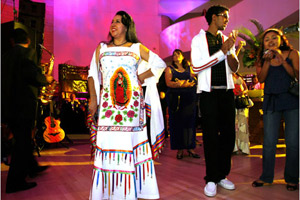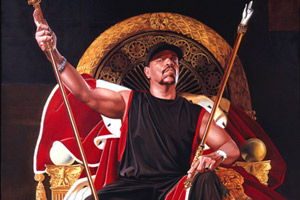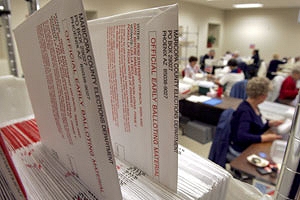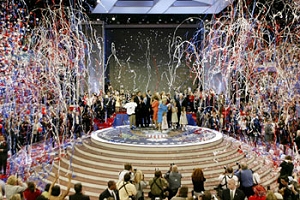Focus on America
U.S. Politics, Literature, Sports Show Influence of Hispanics

The influence of Latinos, especially as the U.S. population grows, is felt in every aspect of society, but especially in baseball, politics and literature, says Pilar O’Leary of the Smithsonian Institution.
This influence has contributed substantially to the country’s rich cultural diversity, she said in a September 11 USINFO Webchat.
“Latinos have a long history in the United States,” O’Leary said. “Decades before English colonists arrived on these shores, Hispanic explorers founded the first European settlement in St. Augustine, Florida.”
Many Latinos come to this country to provide their children with better opportunities in education and to contribute to the economic and cultural fabric of the United States where they may enjoy freedoms and opportunities they might not have at home, according to O’Leary, who develops exhibitions, research and public programs at the Smithsonian Latino Center.
“This is true, I believe, not just for recent Latino immigrants but also for Latino families who have been here for generations,” O’Leary said.
The Latino Center’s Young Ambassador’s Program, an educational initiative for Hispanic secondary school seniors gifted in the arts, provides students from across the country with the opportunity to meet with scholars, artists, curators and other accomplished individuals in the field of Latino arts and culture.
“Latino” is a broad term that generally refers to all peoples from Latin America, including indigenous peoples as well as Europeans, Africans and Asians who settled in Latin America. “Hispanic” is a term that was developed by the U.S. Census Bureau to refer to individuals who speak Spanish and/or are of Spanish descent.
According to U.S. Census Bureau estimates, Hispanics are the largest minority group in the United States at 42.7 million people. With a 3.3 percent increase in population from July 1, 2004, to July 1, 2005, Hispanics are also the fastest-growing group.
INFLUENCE ON SPORTS
O’Leary said Latinos’ influence on baseball is significant, yet football (known as soccer in the United States) icons from Mexico have gained celebrity status in the United States and will “help with the popularity and recognition of the sport.” A quarter of Major League Baseball players are from Puerto Rico and Latin American countries, especially the Dominican Republic, Venezuela, Cuba, Colombia and Mexico, and the Latino Center has partnered with the Smithsonian Institution Traveling Exhibition Service to develop an exhibition on baseball legend Roberto Clemente.
Beatriz Amberman, whose Mexican folkloric performing company strives to educate and promote better understanding of Mexican culture, listens to music at the Smithsonian Latino Centers 10-year anniversary gala and awards ceremony in Washington on September 5. The ceremony celebrated Mexico and Mexican-American achievements. (© AP Images)
“Beyond Baseball” was developed by the Museo de Arte de Puerto Rico and was coordinated by the Smithsonian. The exhibition will include a downloadable bilingual (English and Spanish) podcast and an interactive Web site with a virtual exhibition, children’s activities, lesson plans, biographical highlights and photographs.
Clemente, who was born in Puerto Rico, was a 12-time Major League Baseball all-star selection who helped the Pittsburgh Pirates claim the 1971 World Series, the championship of U.S. professional baseball. (See related article.)
LATINO LITERARY, POLITICAL INFLUENCE
Such Latino authors as Gabriel García Márquez, Mario Vargas Llosa, Carlos Fuentes and Isabel Allende have blazed a trail for Latino authors in the United States and globally, O’Leary said. And there are many other, more contemporary Latino authors who also are gaining serious recognition -- such as Dominican author Julia álvarez, she added. álvarez’s acclaimed novel In the Time of the Butterflies was made into a television film in 2001.
Although the 2008 elections will not be the first time candidates will be faced with the concerns of Latino voters, there is an increasing awareness of Latinos’ importance in the political landscape, O’Leary said. As the population grows in size and becomes economically stronger and more politically savvy, candidates likely will become sensitive to the needs, values and objectives of the Latino community.
“For the first time in history you have political candidates engaging in presidential debates on Spanish-language television” as well as the involvement of politicians in immigration marches, O’Leary said.
SPANISH LEGACY IN UNITED STATES
Many Latinos share a common heritage with Spain, O’Leary said. The Spanish colonized most of Latin America and brought with them the Spanish language -- the language spoken by the majority of the Latino population -- culture, religion and social mores. Latinos in the United States and living abroad still feel a strong nexus to Spain, O’Leary said. “It is Spanish heritage that ties many Latinos from different countries and backgrounds together.”
In recent years, Spain itself has made an effort to connect with Latino communities in the United States and abroad through cultural and educational initiatives, according to O’Leary. For example, in partnership with the Spanish government, the National Portrait Gallery in Washington will host an exhibition at the end of September highlighting the role of Spain in the American Revolution.
“This exhibition should have some strong resonance with Latinos, especially those who feel that U.S. Hispanic heritage is not adequately known or taught today,” O’Leary said.
Additional information on the Smithsonian Latino Center and the exhibitions on Roberto Clemente and the influence of Spain on the American Revolution is available on the Smithsonian Institution’s Web site.
Recently on Focus on America
Hip-Hop Exerts Influence on Contemporary Portraiture
 Hip-hop always has been a potent vehicle for creative expression, but its role in contemporary portraiture has received little attention -- until now.
Hip-hop always has been a potent vehicle for creative expression, but its role in contemporary portraiture has received little attention -- until now.
No Presidential Nominees After Super Tuesday
 When parties in 24 states scheduled primaries and caucuses for February 5 -- the most races ever on a single day in a primary election season -- most political experts said the parties’ nominees would be certain by the end of the day. The experts were wrong: After a record number of Americans voted on Super Tuesday, there is still no presumptive presidential nominee for either party, and the final delegate count still is being tallied.
When parties in 24 states scheduled primaries and caucuses for February 5 -- the most races ever on a single day in a primary election season -- most political experts said the parties’ nominees would be certain by the end of the day. The experts were wrong: After a record number of Americans voted on Super Tuesday, there is still no presumptive presidential nominee for either party, and the final delegate count still is being tallied.
Super-Duper Tuesday
 In an attempt to expand their influence on nomination races, many states moved their primaries or caucuses to early in the year. On February 5, nicknamed "Super Tuesday" or "Super-Duper Tuesday," 24 states hold nominating contests.
In an attempt to expand their influence on nomination races, many states moved their primaries or caucuses to early in the year. On February 5, nicknamed "Super Tuesday" or "Super-Duper Tuesday," 24 states hold nominating contests.